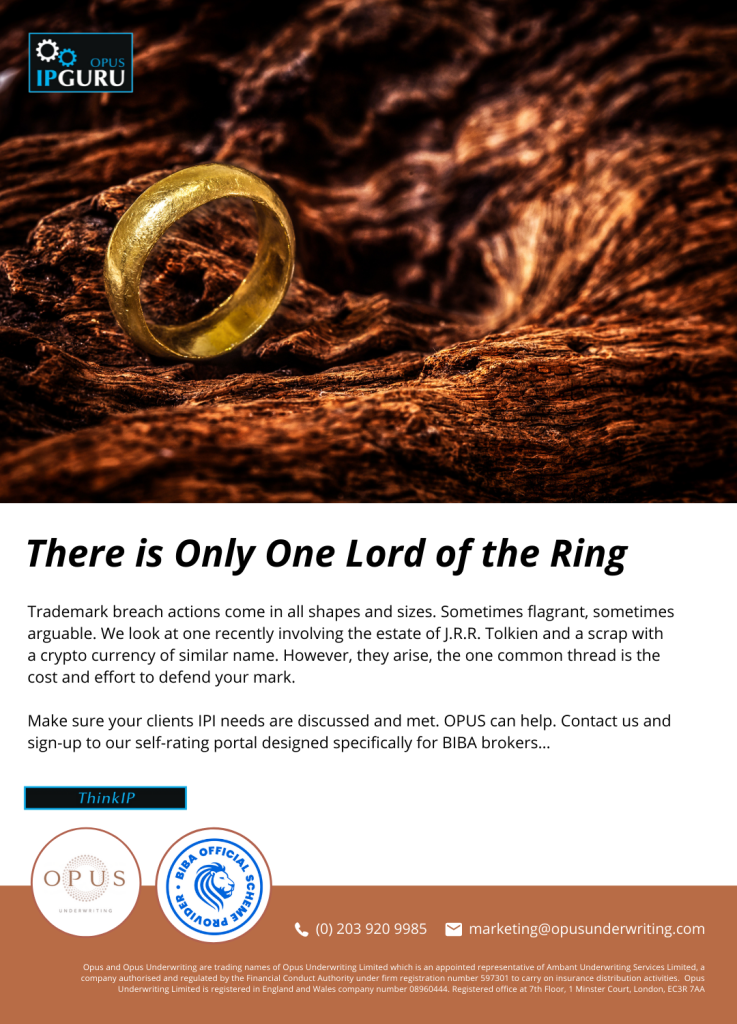The Ring has awoken
Every so often a case comes along in our little corner of law that simply makes you wonder if some folk in business have ever heard of intellectual property rights. And so, one came this month. Perhaps unsurprisingly it emerged from the unregulated and openly defiant industry sector that is crypto currency. Where else. To an IP outsider looking in, it’s almost as if it was dreamed-up after a particularly long lunch. Only no one slept on the idea. In an apparent echo-chamber of lunacy with not a level-headed adviser in sight, they charged ahead and woke the dragon.
…it’s heard its master’s call
The idea was simple if flawed. In August this year, concept inventor and Floridian Matthew Jenson designed a new crypto currency in “Lord of the Rings”-style and called it “JRR Token”. Web address domain name JRRToken.com. Even better, it used the promotional, ‘puntastic’, paraphrasing tagline “One Token That Rules Them All”.
Other promotional material was littered with references to Hobbit holes, Rings and a Wizard…who had the whiff of Gandalf the Grey. He even employed Billy Boyd, the actor who played Pippin in the hit Peter Jackson trilogy, in a talking-head cameo-video endorsement, claiming:
“Saruman was trying to unify Middle Earth under centralised rule whereas the fellowship wanted decentralisation. Cryptocurrency is literally a decentralised network.”
Baffling. What could possibly go wrong?
Tolkien’s estate which holds the IP rights to The Hobbit and Lord of the Rings were having none of this and prepared for battle.
For behold! the storm comes
The estate filed a trademark infringement complaint with the World Intellectual Property Organization (WIPO) – think Council of Elrond but for IP.
At first, Jenson’s lawyers argued, perhaps unimaginatively given the fantasy theme, the word “token” should not be confused with Tolkien. They claimed the,
“…domain name is not identical or confusingly similar” to the Tolkien estate’s trademarks and because of this, the name did not infringe on any of its intellectual property rights.
Getting into the swing of make-believe, they went on to claim the JRR Token referenced “a unique form of digital currency,” and not the legendary author. And if the name “JRR Token” just happened to bring the author J.R.R. Tolkien to mind, then it was a coincidental parody, not an act of bad faith and not a copyright infringement. With a straight face they maintained that “JRR” stands for “Journey through Risk to Reward’.
The Guardian reported the Tolkien estate had a different view claiming the domain name was,
“…specifically designed to mislead internet users into believing that it and the website to which it resolves have some legitimate commercial connection…” with Tolkien.
…the wand of judgement…
The WIPO’s arbitrator held,
“…the respondent does not specify why the disputed domain name is humorous, funny or nail-biting, and not just a domain name chosen due to its similarities with the [Tolkien estate’s] trademarks to take commercial advantage of its evocation”.
As for the “Journey through Risk to Reward” claim, this was swiftly dismissed by the WIPO, saying.
“…it is not clear to the panel what ‘Journey through Risk to Reward’ actually means, and why the term ‘journey’ is relevant to the purchase of tokens”.
WIPO went on to find that Jensen had chosen this name for his cryptocurrency,
“…for the sole purpose of creating a false association.”
It ruled Jenson’s business was well-aware of Tolkien’s name and work and thus his registration and use of “JRR Token” was “in bad faith” and he had,
“…created a website to trade off the fame of these works”
…there is much that is fair…
Resulting from the judgement the Tolkien estate recovered the domain name JRRToken.com. It prevented Jenson from operating under that name and obtained the developer’s undertaking to delete any infringing online content. In addition, Jenson was ordered to pay the estate’s legal costs.
Solicitor Steven Maier for the estate of Tolkien said,
“The Tolkien estate is vigilant in preventing unauthorised parties from taking advantage of the JRR Tolkien name and the content of JRR Tolkien’s literary works. This was a particularly flagrant case of infringement, and the estate is pleased that it has been concluded on satisfactory terms…”
Flagrant though this breach was found to be, it still happened and required a legal action to cut it down with all the attendant costs and uncertainty of recovering them. The Tolkien estate is probably sufficiently seasoned and wealthy to commence and conclude such protective action. Intellectual property insurance de-risks the cost of protecting IP for those that don’t have such deep pockets. You might have clients that need such peace of mind. If you do, please call us. We can help.
Murray Fairclough
Development Underwriter
OPUS Underwriting Limited
+44 (0) 203 920 9985
underwriting@opusunderwriting.com
Researched by Ben Fairclough








